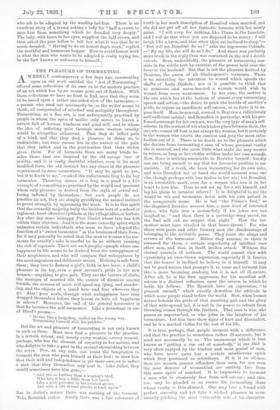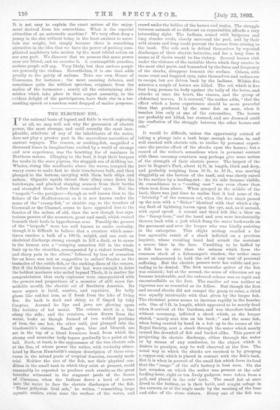THE PLEASURE OF TORMENTING.
AWEEKLY contemporary a few days ago, commenting upon an old work entitled the "Art of Tormenting," -offered some reflections of its own as to the modern practice of an art which has by no means gone out of fashion. With those reflections we have no fault to find, save that they seem to be based upon a rather one-sided view of the tormentor,— a person who need not necessarily be, as the writer seems to think, all compounded of mischief and malignity throughout. Tormenting, as a fine art, is not unfrequently practised by ,people in whom the spice of malice only serves to leaven a nature full of human kindness and good-will, and to whom the idea of inflicting pain through mere wanton cruelty would bo altogether abhorrent. That they do inflict pain .of a kind, and that they find a pleasure in doing so, is undeniable; but their excuse lies in the nature of the pain that they inflict and in the provocation that their victim gives them. For of torments there are many kinds be- sides those that are inspired by the old savage lust of oruelty, and it is really doubtful whether, even in its most modified form, the old instinct has any share in the pleasure experienced by some tormentors. "It may be sport to you, but it is death to me," croaked the unfortunate frog to its boy tormentor. Throwing stones at a frog in a pond is a fair example of tormenting as practised by the stupid and ignorant whose only pleasure is derived from the sight of actual suf- fering inflicted by themselves ; but such people do not practise an art, they are simply gratifying the animal instinct to prove strength by oppressing the weak. It is in this spirit that the cowardly majority bully the luckless butt of a school or regiment, howl offensive epithets at the village idiot, or torture day after day BOMB unhappy Pere G-oriot whom fate has left within their clutches. And it is the same cowardly spirit which animates certain individuals who seem to have adopted the function of a " sworn tormentor" as the business of their lives ; for it may generally be noted that the man or woman who tor- .ments for cruelty's sake is careful to do so without running the risk of reprisals. There are such people,.—people whose one happiness in life seems to be derived from the unhappiness of their neighbours, and who will compass that unhappiness by the most ingenious and, deliberate means. Nothing is safe from ,them; they love to destroy a girl's faith in her lover, a child's pleasure in its toy, even a poor servant's pride in her new bonnet,—anything to give pain. They are the terrors of clubs, the scourges of married life, the causes of disunion among friends, the sources of most evil-speaking, lying, and slander- ing, and the objects of a timid hate and fear wherever they go. Alas ! poor souls, through what 'unhappiness have they dragged themselves before they learnt to hate all happiness in others ? Moreover, the end of the general tormentor is that he becomes the self-tormentor. Like a personage in one of Hood's poems,— " He lies like a hedgehog, curled up the wrong way, Tormenting himself with his prickles."
But the art and pleasure of tormenting is not only known to such as these. Most men find a pleasure in the practice, to a certain extent, and nearly every woman,—every woman, perhaps, who has the element of coquetry in her nature, and who delights to take a part in the eternal skirmishing between the sexes. Few, at any rate, can resist the temptation to torment the man who puts himself at their feet; to show him that their will and independence is yet their own, or to inflict a stab that they themselves may heal it. Like Juliet, they would sometimes have hi ru gone,— "And yet no further than a wanton's bird,
Who lets it hop a little from her hand, Like a poor prisoner in his twisted owes, And with a silk thread plucks it back again." • But in Juliet's nature there was nothing of the torment. 'Take Rosalind, rather. Surely there was a fair substance of truth in her mock description of Rosalind when married, and she did not put off all her fantastic humour with her manly guise. "I will weep for nothing, like Diana in the fountain, and I will do that when you are disposed to be merry ; I will laugh like a byen, and that when thou art inclined to sleep."— " But will my Rosalind do so P" asks the ingenuous Orlando. —" By my life, she will do as I do." And there was probably more truth in the reply than was contained in the mot a double entente. Here, undoubtedly, the pleasure of tormenting con- sists in the subtle test, by exercise, of the power held over the lover or the husband. But that is not the pleasure derived by Beatrice, the queen of all Shakespeare's torments. There is no mistaking the intention to wound which speeds the shafts of Lady Disdain ; nor is it possible to think that so generous and warm-hearted a woman would wish to wound from mere wantonness. In her case, the motive is the one which lies at the bottom of almost every tormenting speech and action,—the desire to prick the bubble of another's pride, to expose an inordinate self-esteem, or to force it to ex- pose itself. Man, in general, seemed to Beatrice a ridiculously self-sufficient animal; and Benedick in particular, with his pro- fessed contempt for her own sex, was the very type of man's self- esteem. In the contest of wit which takes place between them, the one who comes off best is not always the woman, but it certainly is the woman who courts the contest and gets the most satis- faction out of it. There is no doubt as to the pleasure which she derives from tormenting a man of whose personal vanity she is assured, and she cares little what stabs she may receive in return, as long so her victim writhes under her own wounds. Now, there is nothing unamiable in Beatrice herself ; hardly can one bring oneself to say that her favourite pastime is nn- amiable. Of a truth, she loves tormenting for its own sake, and were Benedick not at hand she would torment some one else, though perhaps with less malice in her wit; but Benediok is an irresistible mark, even for a woman who has it in her heart to love him. Does he not set up for a wit himself, and lay his plans to torment others ? It is delightful to see the would-be wit and tormentor hoist with his own petard in the masquerade scene. He is but "the Prince's fool," so the disguised Beatrice assures him, a poor kind of tolerated jester, who falls into a melancholy if his jokes are not laughed at; "and then there is a partridge-wing saved, for the fool will eat no supper that night." How the tor- mentor must have revelled in that home-thrust ! For wits aha re with poets and other literary men the disadvantage of belonging to the irritabile genus. They court the slings and arrows of the tormentor. Either they assume, or there is assumed for them, a certain superiority of intellect over other men, and that, in itself, invites attack. Witness the eternal quarrels of authors. The world cannot view with equanimity an over-blown reputation, especially if it fancies that the bearer is inclined to believe in it himself. It may not be good-nature that prompts it to tease and torment him into a more becoming modesty, but it is not all ill-nature. After all, he is the first aggressor, for his manifest self- esteem is a distinct reflection upon the esteem in which he holds his fellows. The Spanish have an expression, "to peacock oneself," which exactly describes the attitude in which some people stand before the world. Now, when human nature beholds the pride of that strutting gait and the glory of that wide-spread tail, it is not in its power to refrain from throwing stones through the feathers. That man is wise who passes on unperturbed, or who joins in the laughter of his tormentors. Let him once show signs of hurt and discomfort, and he is a marked victim for the rest of his life.
It is true, perhaps, that people torment with a difference, and that the practice is sometimes rather ill-natured; but it need not necessarily be so. The amusement which is best known as "getting a rise out of somebody," is one that is very often enjoyed by the kindest and most genial of men, who have never quite lost a certain mischievous spirit whish they possessed as schoolboys. If it is an offence, then are women greater offenders than men, for not even the most demure of womankind are entirely free from this same spirit of mischief. It is impossible to torment a man who is absolutely free from self-esteem ; and this, too, may be pleaded as an excuse for tormenting those whose vanity is thin-skinned. One may love a friend with perfect sincerity and yet take a wicked pleasure in occa- sionally pricking the most vulnerable side of his character. It is not easy to explain the exact nature of the enjoy- ment derived from his contortions. What is the especial attraction of an automatic machine? We very often drop a penny in the slot without being in the least anxious to ascer- tain our weight, but simply because there is something attractive in the idea that we have the power of putting com- plicated machinery into motion by the most trivial action on our own part. We discover that we possess this same power over our friend, and we exercise it. A contemptible practice, serious people will say. Very likely, but then serious people are generally the victims. Nevertheless, it is one that adds greatly to the gaiety of nations. Take our own House of Commons, for instance ;, the most amusing debates, and sometimes quite the wittiest speeches, originate from the malice of the tormentor ; nearly all the entertaining skir- mishes which take place in that august assembly, to the evident delight of the participators, have their rise in a tor- menting speech or a careless word dropped of malice prepense.



































 Previous page
Previous page